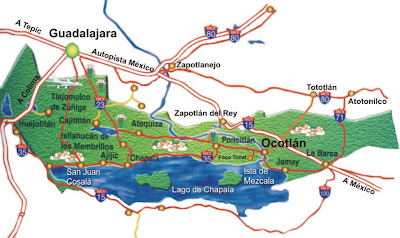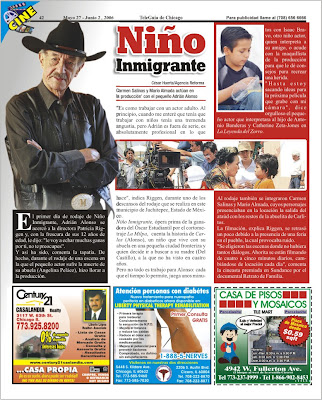


Born in
Ocotlán, a small rancho in the state of Jalisco, Mexico,
Eddie Sotelo...
Eddie "Piolín" Sotelo is a Mexican-American radio personality, born in Ocotlán, Jalisco in 1972. His show, "Piolín por la Mañana," runs weekday mornings on KSCA in Southern California. His nickname means
"Tweety Bird" in Spanish, a nickname he acquired as a child.

...but Eddie had no money, so he would climb onto the roof and watch from above. It was from there that he first watched
Mário Almada films. Almada is the Mexican version of the action hero; never without his rifle, he’s Eastwood and Bronson wrapped into one. In these films, characters would talk about the U.S. Eddie got curious and started to investigate. One day, he asked his father if he could go work in the U.S. In 1986, while Mexico was hosting soccer’s World Cup, Eddie arranged for a coyote to cross him over from Tijuana.

Meanwhile, his crew of seven producers and sketch players — hailing from places as varied as Mexico, El Salvador and Peru...
Peruvian-born Luis Garibay sets up gunshot sound effects like a court stenographer: Cock, Cock, BOOM! This is especially effective on the
Piolínbomba, where listeners call in and tell their jokes.
Chela Prieto, a single mother of two;
Don Poncho del Codo Agarrado, an old retired politician who firmly believes men are superior to women;
Casimiro Buena Vista Mira Lejos, the town drunk;
El Talpujas;
Chipilín;
Culantro; and 14-year-old
Telorino. The show comprises
chistes (jokes),
bromas (pranks) and crank calls that are at times sexual in content but generally in good taste and good fun.

Like his idol, Mexican comedian
Luis De Alba, Piolín strives to entertain the masses. But lowbrow humor is only half the story. Community involvement is what sets locutores like Piolín apart from their English-language counterparts. They help their listeners with immigration issues, financial crises, illness and legal troubles.
An Arbitron study showed that at 18.4 percent of the market share,
Mexican Regional, which is Piolín’s station’s format, is by far the favorite Spanish-language format among Hispanic listeners, particularly in the morning. What is Mexican Regional? Norteños like
Lalo Mora’s “Aguanta Corazón” (Mora recently came on Piolín’s show and downed a bottle of Salvadoran liquor), Banda el Recordo de Don Cruz Lizarraga’s
“El Sinaloense,” and Corrido classics like Antonio Aguilar’s
“Lamberto Quintero.”
Perhaps he was taking a jab at Piolin’s main rival, Renán Almendárez Coello, known as
“El Cucuy” (“The Boogey Man”). El Cucuy has held the top spot in Spanish-language radio for as long as anyone can remember. With his
Tropa Loca (“Crazy Crew”), El Cucuy is considered the Howard Stern of Spanish-language radio
El Cucuy says his comedy is based on
picardía, a popular form of Latin humor based on wordplay and double-entendres. As a general rule, no cuss words are allowed on morning radio, especially since a lot of children listen to the shows, but that doesn’t mean Spanish slang words like
baboso or
güey (both meaning “idiot”) aren’t used.
Piolín is also less crude and overtly sexual than Cucuy, relying more on a typically Mexican form of double entendre known as
albur. ("I don't think you need to say bad words to make people laugh," Piolín says.) Some of the humor is so colloquial it may sound foreign, even to other Spanish speakers.
Wikipedia entry for
albur










